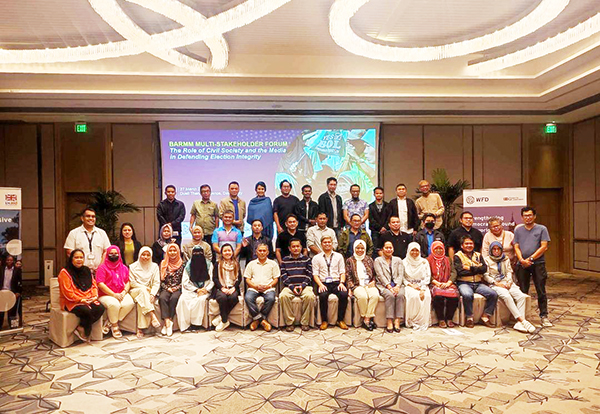DAVAO CITY – Thirty journalists and civil society organization (CSO) members from Mindanao convened here on Wednesday, March 27, to address the challenges encountered in elections, especially as the 2025 parliamentary elections in the Bangsamoro region approach.

THIRTY journalists and civil society organization members from Mindanao convened in Davao City on Wednesday, March 27, to discuss the challenges in the upcoming 2025 parliamentary elections in the Bangsamoro region. (Ivy Tejano)
The “BARMM (Bangsamoro Autonomous Region in Muslim Mindanao) Multistakeholder Forum: The Role of Civil Society & the Media in Defending Elections Integrity” organized by the United Kingdom’s Westminster Foundation for Democracy (WFD), a non-departmental public body, discussed the current state of the region.
Judy Ann Lubiano, Bangsamoro program manager of the WFD, said the forum aimed to gather views from various stakeholder groups in BARMM and Mindanao, particularly media, to discuss common issues about genuine citizenship participation in parliamentary and election processes.
“The media group is the sector we were not engaging with as much as we should have been. The crucial part of media freedom and media literacy and their role in promoting active citizenship in the Bangsamoro region is essential, especially in the upcoming BARMM election,” Lubiano said.
Journalists from the Bangsamoro and Davao regions and the CSO members pinpointed significant concerns that influence the coverage of the BARMM election and how to address such concerns to ensure fair, transparent, honest, and safe parliamentary polls.
The participants highlighted various concerns, including safety and security, partisanship, data or information accessibility, transparency gaps, religious prejudices, obscured agenda, and language barriers.
According to the WFD, CSOs in the BARMM typically have a complicated relationship with the government. Their focus on issues and confrontational approaches often lead to distrust from government officials.
Lubiano emphasized the importance of the forum in deliberating the roles of the CSOs and media in guiding people to active civic participation and finally rebuilding trust in the credibility of elections, manifesting the health of democracy and people’s faith in democratic institutions.
“The political parties will soon fill half of the seats in the Bangsamoro parliament, and we want to eventually get to the point where we vote for people not based on personalities or name recall but on account of our values aligning with the values of a specific party,” she said.
Minister of Parliament Lawyer Suharto “Teng” Ambolodto, a member of the Bangsamoro Transition Authority (BTA) who facilitated the event from March 24 to 28, said the forum seeks to collaborate with CSOs and the media to ensure credible elections in BARMM in May 2025.
Ambolodto stressed the significance of fair, clear, and honest regional elections. He said next year’s elections marks a crucial juncture in the Bangsamoro and Philippine history, presenting an opportunity to influence the future of Bangsamoro and facilitate significant change.
The WFD is a leading program supporting the BTA in delivering on the Bangsamoro Organic Law (BOL) and funded through the UK government’s Conflict, Stability, and Security Fund. It seeks to help support democracy across the world by helping to make the political system fairer and liable.